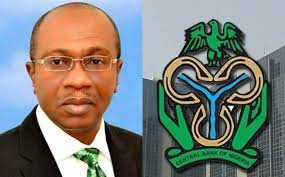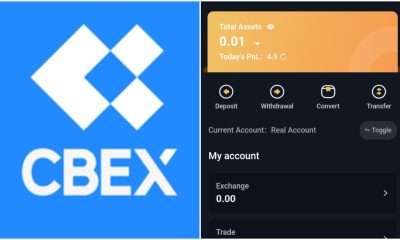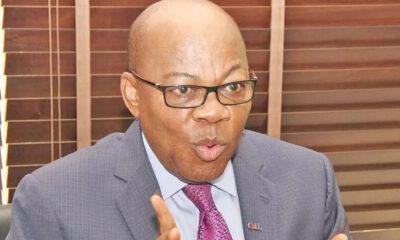Business
CBN plans digital currency launch before December

- Reps back bill stopping foreign accounts for bankers
The Central Bank of Nigeria has said it will launch a digital currency before the end of this year.
The Director, Information Technology, CBN, Rakiya Mohammed, disclosed this on Thursday, during a virtual media briefing at the end of a Bankers Committee meeting also held virtually.
He said, “The digital currency would be accessible to all Nigerians. Just like everybody has access to cash, everybody will have access to the central bank’s digital currency. Let me state categorically that cryptocurrency such as Bitcoin and the rest of them are not under the control of the central bank; they are purely private decisions that individuals make.
“We have spent over two years studying this concept of central bank’s digital currency and we have identified the risks. And it is one of the reasons why I said we are setting up a central governance structure that would involve all industry stakeholders to access all the risks as we continue on this journey.
“Very soon we would make an announcement on the date for the launch and by the end of the year we should have the digital currency.”
Meanwhile, a bill seeking to prohibit bank employees from operating foreign accounts has passed second reading at the House of Representatives.
The lawmakers voted in favour of the bill after which it was referred to the house committee on anti-corruption.
The bank employees’ declaration of assets act amendment bill also seeks to mandate the bankers to declare assets of their spouses and children less than 18 years old.
The Economic and Financial Crimes Commission (EFCC) had in March ordered those in the banking sector to declare their assets in accordance with the act, raising questions as to the legality of such directive.
The bank employees’ declaration of assets act requires bank board members, managing director, general managers, clerks, cashiers, messengers, cleaners, drivers, and any other category of workers — whether part‐time, casual or temporary — to declare their assets.
Leading the debate on the bill on Thursday, sponsor of the bill, Shina Peller, said it had become necessary to expand the scope of the act regarding those who should declare their assets.
He said the act was “aimed at monitoring the activities of bank employees and customs officers to ensure that their lifestyle reflects their earnings, and to discourage them from engaging in corrupt practices.”
“However, human society is very dynamic; as society changes, it becomes imperative to amend the laws to reflect the changes in the society for the laws to serve their purposes effectively and efficiently. It is for this reason that I am proposing the amendment to this Act,” he said.
Peller said the bill sought to extend the application of the act to employees of other financial institutions including pension funds agencies, insurance firms, stocks brokers among others.
He added that when passed into law, the bill would transfer the responsibility of keeping assets declaration form from the Secretary to the Government of the Federation to the institution’s regulatory body.
“The principal act applies to employees of the Nigerian Customs Service. With the coming into effect of the 1999 constitution (as amended) on the 29th of May 1999, all public servants, including employees of the customs service must declare their assets to the Code of Conduct Bureau,” he said.
“This amendment bill addresses this anomaly by removing the employees of the customs service from employees which the principal act applies to.
“Under the principal act, it is only the assets of bank employee concerned which shall be declared in the form. The act does not apply to the spouse and unmarried children under 18 years of the declarant. This is another loophole of the Act which may be exploited.”
Business
Naira rises to N1,618/$ in parallel market

Naira rises to N1,618/$ in parallel market
The naira yesterday appreciated to N1, 618 per dollar in the parallel market from N1,620 per dollar on Monday.
But, the Naira depreciated to N1,604 per dollar in the Nigerian Foreign Exchange Market (NFEM).
READ ALSO:
- I’m capable of becoming Nigeria’s president — Makinde
- Outrage over video of police officers collecting cash from Chinese man
- Nigerians lose N1.3tn as ponzi scheme CBEX collapses
Data published by the Central Bank of Nigeria, CBN, showed that the indicative exchange rate for the naira rose to N1,604 per dollar from N1,599 per dollar on Monday, indicating N5 depreciation for the naira.
Consequently, the margin between the parallel market and NFEM rate narrowed to N14 per dollar from N21 Monday.
Naira rises to N1,618/$ in parallel market
Insurance
Lasaco Assurance Plc attains ISO/IEC 27001:2022 Certification for Information Security Management

Lasaco Assurance Plc attains ISO/IEC 27001:2022 Certification for Information Security Management
Lasaco Assurance Plc, one of the leading insurance companies in Nigeria, is pleased to announce that it has successfully obtained the ISO/IEC 27001:2022 certification, a globally recognized benchmark for Information Security Management Systems (ISMS).
This certification comes after a thorough and detailed re-certification audit, validating its commitment to upholding the highest standards in information security and cybersecurity.
The ISO/IEC 27001:2022 certification highlights Lasaco’s ongoing efforts to protect confidential information, manage risks, and enhance its approach to information security, aligning with global best practices.
Speaking on this new development, the Managing Director, Lasaco Assurance Plc, Mr. Razzaq Abiodun, said, “We are incredibly proud of this achievement, which demonstrates our dedication to maintaining the highest standards of operational excellence and continuous improvement.
READ ALSO:
- Stop promoting risky coins, unlicensed platforms, SEC warns influencers
- Many killed as suspected herdsmen attack Benue community
- Court throws out Femi Falana, Falz’s defamation suit against VeryDarkMan
“In today’s digital age, ensuring the safety and security of sensitive information is of paramount importance, and this certification reaffirms our commitment to being a trusted and responsible organization.”
ISO/IEC 27001:2022 offers a structured framework for managing and securing critical business information, ensuring that all aspects of the organization’s information security are addressed through proactive risk management. This certification affirms Lasaco Assurance’s robust commitment to safeguarding sensitive data against emerging cyber threats.
“Moving forward, we remain dedicated to ensuring the highest level of information security, compliance, and excellence in all our operations,” the Head of IT, Lasaco Assurance, Mr. Dimeji Ogundele said.
The company extends its deepest gratitude to its entire team, clients, and partners whose support was pivotal to achieving this certification. Lasaco Assurance Plc is a composite insurance company, providing a wide range of insurance solutions.
With a rich history of trust, innovation, and customer satisfaction, Lasaco continues to deliver reliable and cutting-edge services to individuals, businesses, and government institutions.
Lasaco Assurance Plc attains ISO/IEC 27001:2022 Certification for Information Security Management
Business
5 facts about trending digital trading platform, CBEX

5 facts about trending digital trading platform, CBEX
Investors have been left counting their losses after digital trading platform, China Beijing Equity Exchange (CBEX) crashed on Monday, April 14.
Many distraught investors took to social media, especially X and TikTok, to bemoan their losses, which was estimated at N1.3 trillion.
Following reports of the platform’s crash, some investors on Tuesday broke into CBEX’s office in Oke Ado area of Ibadan, Oyo State and looted furniture, electronics and other valuables.
Facts about CBEX and its operations:
1. CBEX is a digital trading platform that promised investors 100% profit within 30 days, by trading digital assets. Its purported goal was to create a secure, transparent environment for transactions.
2. CBEX reportedly attracted around 300,000 users, majority of whom are Nigerians, despite not being registered with Securities and Exchange Commission (SEC), making its operations illegal under the Investment and Securities Act (ISA) 2025. CBEX’s CEO, Yahaya Ibrahim claimed the platform was a registered Canadian crypto exchange, but no evidence supported this, and operations were primarily Nigerian-focused.
READ ALSO:
- Titanic: Found ladies watch for auction at £50,000
- Gunmen rape woman to death, husband brutally attacked in Nasarawa
- EFCC arraigns Chinese Lao Liu for false information
3. Around April 9, investors reportedly faced withdrawal failures as funds in their wallets vanished. CBEX attributed the withdrawal issues to a “security breach” and demanded additional deposits for “verification”. The verification options included $200 fee for $2,000 wallet balance and $100 for $1,000 wallet balance.
4. The crash reportedly affected over 300,000 users, with estimated losses exceeding $840 million (N1.3 trillion), devastating investors, some of whom lost life savings or loans. Cryptocurrency expert and security analyst, Taiwo Owolabi said available data indicated that the funds were moved to a TRX address: (TDqSquXBgUCLYvYC4XZgrprLK589dkhSCf). He noted that a total volume stolen so far in USDT is $847 million and likely to increase.
5. The Securities and Exchange Commission (SEC) has continued to warn the public against investing in unregistered platforms like CBEX, citing risks of fraud and lack of investor protection. Prior to CBEX’s crash, SEC stated that ISA 2025 signed by President Bola Tinubu makes it an offence for any entity to operate an online forex trading platform or provide related services without prior registration with the commission.
“By virtue of this Act, it is an offence in Nigeria for any entity that is not registered by the commission to carry out the business of online foreign exchange trading platforms or related services.
“Any business entity with the plan of setting up a business in any of these areas is advised to visit the HOD DRM Department of the commission for further direction on how to register with the commission to avoid sanctions,” SEC said.
5 facts about trending digital trading platform, CBEX
-

 Business1 day ago
Business1 day ago5 facts about trending digital trading platform, CBEX
-

 Education3 days ago
Education3 days agoNELFUND: How schools, banks are ripping off students
-

 metro2 days ago
metro2 days agoRivers administrator demands N300m refund from NBA after relocating conference
-

 International2 days ago
International2 days agoObama reacts as Trump freezes $2.3b Harvard University funding
-

 Politics2 days ago
Politics2 days ago2027: PDP governors reject alliance of opposition parties
-

 metro1 day ago
metro1 day agoBREAKING: Court strikes out defection suit against 27 pro-Wike Rivers lawmakers
-

 metro1 day ago
metro1 day agoNatasha’s allegation against Akpabio has contradictions – Agbakoba
-

 Insurance14 hours ago
Insurance14 hours agoLasaco Assurance Plc attains ISO/IEC 27001:2022 Certification for Information Security Management









